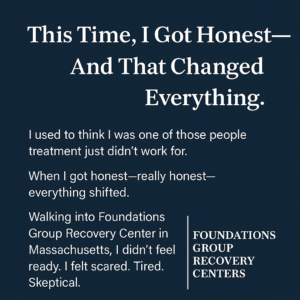I used to think I was one of those people treatment just didn’t work for. You know—the ones who try, fail, disappear for a while, and maybe try again because they’re desperate or ashamed or both. I’d been in a few programs. I could spout off the lingo, list the steps, talk about triggers and coping strategies. I’d learned the script.
But none of it stuck.
Relapse wasn’t just a risk for me. It was my pattern. I thought that meant I was broken in a way no one could fix. But looking back, I don’t think I was broken. I think I was just tired of pretending.
When I got honest—really honest—everything shifted.
Relapse Wasn’t Failure—It Was Data I Hadn’t Wanted to Face
I remember waking up after that last relapse and thinking, “I can’t believe I did it again.” My body hurt. My heart hurt. I was embarrassed, numb, and angry at myself.
But underneath all that, there was this whisper: “Something has to change.”
That whisper saved me. It told me to stop seeing relapse as a punishment. Instead, I started seeing it as information. Every time I slipped, it showed me where I was still hiding—where I wasn’t telling the truth, even to myself.
Relapse didn’t mean I was weak. It meant something in my recovery plan wasn’t honest enough, deep enough, or supportive enough. And that mattered.
Getting Honest Meant Admitting What Wasn’t Working
I used to act like I had it together because I thought that’s what recovery looked like. Smile in group. Use the buzzwords. Numb the cravings with distractions. Push through. Don’t make people worry.
But that performance was costing me everything.
I was still lying—to others and to myself. I said I was okay when I wasn’t. I said I believed in recovery when I wasn’t even sure I believed in myself. And I kept saying, “I’ve got this,” when what I really meant was, “Please don’t leave me.”
Getting honest meant saying the hard stuff out loud:
- “I’m not okay.”
- “I still crave it.”
- “I don’t know who I am without it.”
- “I don’t think I want this—but I think I want to want it.”
It was terrifying. But it was also the beginning of something real.
This Time, I Asked for Help Without Pretending to Be Ready
Walking into Foundations Group Recovery Center in Massachusetts, I didn’t feel ready. I felt scared. Tired. Skeptical. Honestly? I didn’t know if I believed it would work. I just knew I couldn’t keep doing what I was doing.
But instead of pretending to be confident, I told the truth. I said, “I’ve done this before. It didn’t help. I don’t know if I’m wasting your time.”
And what I heard back was: “You’re not. Let’s start from where you actually are.”
No fake smiles. No pressure. Just a quiet kind of welcome that felt safer than anything I’d felt in a long time.
That moment—being met instead of managed—changed everything.
Foundations Gave Me Space to Be Real
I’d been to places that felt more like hospitals than healing. Places that talked about “personalized care” but treated everyone the same. Foundations was different.
The staff didn’t just have degrees—they had depth. Many had lived it too. There was no hierarchy of suffering. No one-upmanship. Just people being real, with pain and humor and hope all mixed together.
In group, I said things I’d never said out loud before. And instead of silence or judgment, I got nods. Eye contact. “Me too.” And sometimes, just someone sitting next to me in the quiet.
That space—to speak, to break, to not know—was medicine in itself.
Foundations didn’t fix me. They didn’t need to. They gave me what I needed to find my own footing: safety, connection, and a reason to keep trying.
I Still Don’t Have It All Figured Out—But I’m Not Hiding Anymore
Recovery isn’t linear. I don’t wake up every day feeling inspired. Some mornings, I still think about using. Some days, I feel lost or angry or ashamed. But now, I talk about it. I let people in.
That’s the difference.
Before, I was managing an image. Now, I’m building a life.
It’s not perfect. It’s real.
And honestly? That’s enough.
If you’re reading this and wondering if it’s too late for you—or if you’re just too tired to try again—I get it. But I promise: it’s not about being ready. It’s about being honest.
That honesty might be the first real step toward something that actually works.
FAQs About Opiate Addiction Treatment in Massachusetts
What if I’ve been to treatment before and it didn’t work?
You’re not alone. Many of us have been through programs that didn’t feel like a fit. That doesn’t mean recovery isn’t possible—it means you haven’t found the right support yet. Foundations Group Recovery Center offers opiate addiction treatment in Massachusetts that actually meets you where you are.
Is relapse a sign of failure?
No. Relapse is part of the process for many people. It doesn’t mean you’ve failed. It means something in your recovery plan needs to shift. It’s an opportunity to try again with more honesty and support.
How is Foundations different?
At Foundations, you won’t be treated like a case file or a statistic. The team brings lived experience and deep empathy. You’ll help shape your own treatment plan, and you’ll be supported in showing up just as you are—even if that means scared, unsure, or skeptical.
Do I have to be “ready” to start?
Absolutely not. Being ready is a myth. What matters is being open—even just a little bit. That’s enough to start a conversation. Foundations works with people at every stage of readiness, and no one expects you to have it all figured out.
How can I get started?
You can call (844)763-4966 to speak with someone who’s been there. No judgment. No pressure. Just a real conversation about what could be next.
When You’re Ready to Get Honest, We’re Here
You don’t have to fake it anymore. If you’re in Massachusetts and you’re looking for opiate addiction treatment that actually feels human—Foundations is here. It’s not about being perfect. It’s about being real. And that might just be the start of everything.
📞 Call (844)763-4966 today. Your story’s not over. Let’s talk about the next chapter.


